Permaculture Principles for Modern (Zero Waste) Living
Have you heard of permaculture? Founded by Bill Mollison and David Holmgren in the 1970s, permaculture was the development of agricultural ecosystems intended to be sustainable and self-sufficient. The term came from “permanent agriculture.”
Let me tell you, it’s actually about a lot more than gardening.
Since the 1970s, the idea has expanded and grown, as has the movement. At its core it is a ‘systems thinking’ approach, and the design principles can be applied to anywhere where sustainability is the focus.
But many people would describe permaculture as a “philosophy” – a set of guidelines to live by. Many people would describe zero waste in the same way. Both have the idea of fair share, not taking or using more than we need, not wasting resources or people.
Because of this, I think permaculture principles (and ethics) are just as relevant for plastic-free (and zero waste) living. They are relevant to people living within cities, and without so much as a pot plant to their name.
But many people without gardens simply don’t know enough (or anything!) about it.
Let’s change that! I’d like to introduce the permaculture principles, and their relevance (as I see it) to the zero waste movement.
Permaculture Living: The Three Ethics
At the centre of the movement are three ethics: people care; earth care; and fair share. I would argue that anybody who believes in sustainability believes in these three ethics.
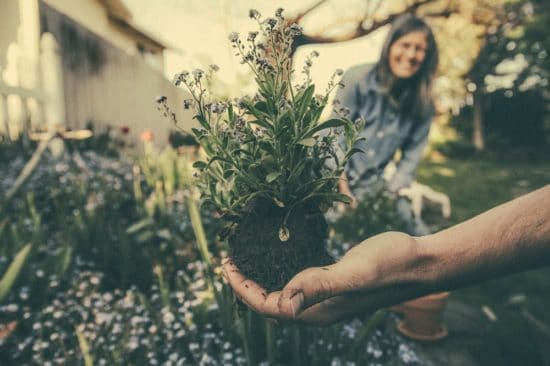
Permaculture Living: The 12 Principles (And How They Relate To Zero Waste Living)
The 12 principles of permaculture, developed by David Holmgren in 2002, are described as “thinking tools”. Used together, they can enable us to re-design both our environment and our behavior in a world of less energy and resources.
They are guiding principles for an ethical lifestyle.
Observe and Interact.
To me, this is about taking the time to look around us, to explore our surroundings and learn from others. We often learn good habits from others, or we find answers simply by watching and thinking.
By asking questions, seeking out information and being open to learn, we can come up with solutions that work for us.
Catch and Store Energy.
To me, this is about efficiency. Making the most of things when they are abundant, and being able to use them when they are not.
We think of energy as electricity or power, but it’s just as true for water and food, and the energy embedded in resources. From a zero waste perspective, maximising the use of anything is encouraged.
I like to think of reusables as “caught and stored energy”. An item, build to last and used forever. Rather than single use items that require energy to make, energy to ship and then are gone from usefulness forever. Wasted energy.
Obtain a Yield.
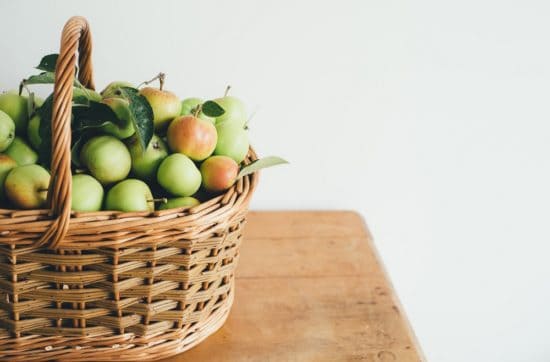
In gardening terms, this principle is pretty obvious. Actually, it should apply to everything we do. Money is another obvious yield, but it goes deeper. We don’t have to be paid for something to get pleasure from it. Yield can also mean enjoyment, satisfaction, motivation, and fulfillment.
When we love to do something, the pleasure of simply doing it can be its own reward.
There is a danger of doing things that bring us no pleasure, satisfaction nor other reward: they ultimately leave us burned-out, demotivated, resentful and frustrated.
That’s not sustainable.
Apply Self Regulation and Accept Feedback.
Permaculture looks at this from a systems perspective, but I think it’s just as relevant for individuals.
None of us are perfect. We strive to do the best we can. When we receive feedback telling us there is a better way, or pointing out something we hadn’t thought of before, we can begrudge and feel judged and not take action; or we can embrace the challenge to improve ourselves a little more.
Use and Value Renewable Resources and Services.
This is definitely a principle that underpins both the plastic-free and zero waste movements. Most plastic is made from non-renewable fossil fuels, and recycling options for all plastics are limited (and result in downcycling).
The zero waste movement embraces a circular economy, and aims to see nothing sent to landfill.
Both movements value choosing materials that are natural, renewable, reusable, recyclable and biodegradable.
Produce No Waste.
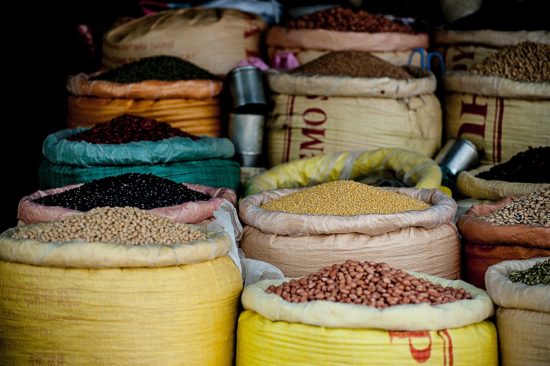
My favourite principle! Clearly the zero waste movement is built around “produce no waste”, but permaculture has a different (broader) perspective.
Whilst permaculture recognizes there is a bigger system, the zero waste movement can lean towards individualism.
In permaculture, reusing and repurposing other people’s waste is a huge part of reducing our impact and use of resources. The zero waste movement celebrates individual action and achievement: it focuses on reducing personal landfill waste, but doesn’t always recognize that waste is still produced upstream.
Personally, I think they both have a place, and I think both ideals can learn from the other.
Design From Patterns to Details.
This principle recognises the value in observing before doing, and the importance at looking at the bigger picture before making choices.
From a zero waste/plastic-free perspective, I see the patterns as “habits” and details as “stuff”. Rather than deciding to embrace a low-waste lifestyle and then spending hours choosing the best mason jars to equip the pantry with, it is better to look at our habits first.
Take time to look for the patterns, and then decide what fits best.
It’s another way of saying: take time, observe first, and do second.
Integrate Rather Than Segregate.
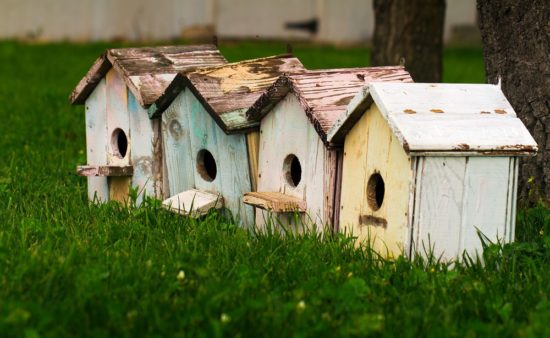
Integration is important for any community. It’s what glues community together, and it’s what creates a movement. To get the best outcomes, we need to work together.
There is no ‘them’ and ‘us’. There is only ‘us’.
Whether we teach, motivate, encourage or provide support, communities are best when we embrace networks, share freely and collaborate.
Community is strong in both permaculture and zero waste, and for many of us, that’s the best part.
Use Small and Slow Solutions.
Bigger isn’t always better. Small and slow solutions are at the heart of the zero waste movement. Taking time, making do, thinking creatively; embracing local and seasonal.
Use and Value Diversity.
There is never a “one-size-fits-all” approach. There is rarely a single way to do anything. There are different voices and different perspectives, and different ways of doing things, even when the outcomes are similar.
We connect with different stories, and everyone has something to add.
Use Edges and Value the Margins.
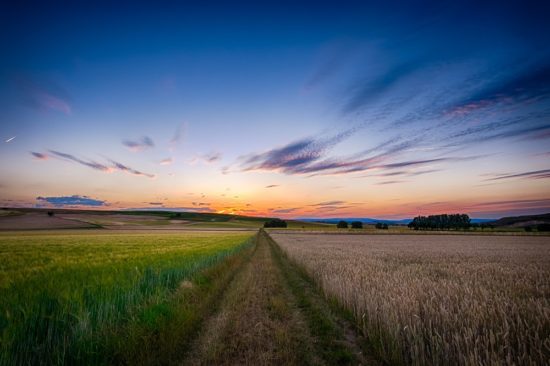
In permaculture, we talk about the interfaces between things being where the most valuable, diverse and productive elements lie. The edge of a pond, lake or river; or the edge of the forest where the trees meet the grassland.
In zero waste, I think of these “edges” and “margins” as the parts that are often seen as waste – things like offcuts or scraps. Yet they have just as much potential and are just as valuable – it often just takes a little creative thinking.
Creatively Use and Respond to Change.
“Vision is not seeing things as they are but as they will be.†Both the permaculture and zero waste movements are build around a desire to do things differently; to do things better than the “status quo” of overconsumption and exploitation.
Both embrace creativity, not at an artistic level but at a solutions-based, practical and ideas level. Looking at the system, and creating new ways to do things better. Seeing things that aren’t working, and coming up with better ways.
It isn’t about having all the answers, or creating change on a global scale. It’s about being creative with what we know and what we see, and doing things differently.
For me, both permaculture and zero waste living offer practical solutions for those of us that feel dissatisfied with the current ways of the world, and want to create a more positive future. Neither are perfect, but they enable us to do things differently, and encourage those that follow to go one step further.
Now I’d love to hear from you! Is permaculture new to you or old news? How do you think the permaculture principles compare to zero waste living? Which principles do you personally see as the most important – or do you think all of them? Do you have any personal principles that you live by? Anything else to add? Please share your thoughts in the comments below!
[leadpages_leadbox leadbox_id=1429a0746639c5] [/leadpages_leadbox]
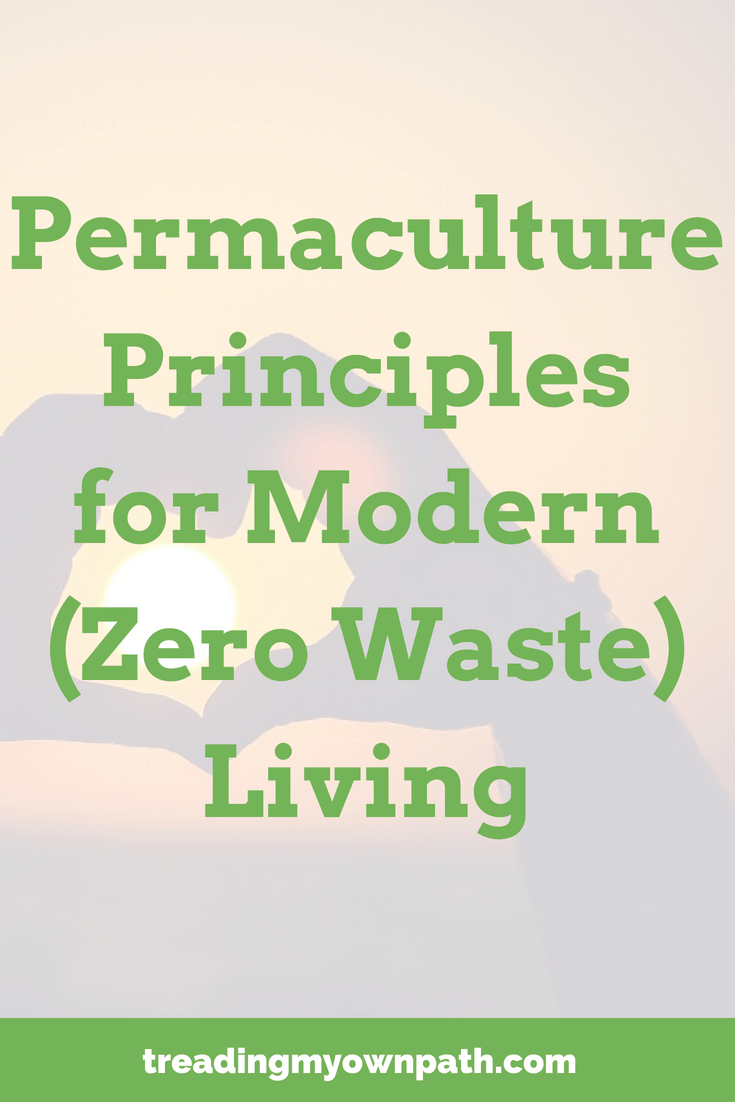




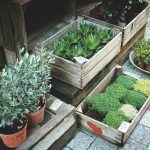

This might be my favorite post on Treading My Own Path, Lindsay! I’m wrapping up a season volunteering at a small organic vegetable farm (time to go back to my real job teaching school) so the influences from agriculture seem even more poignant to me right now. It’s true that sometimes I see zero-wasters talking about rifling through bins to find onions that don’t have stickers on them or presenting glass containers at a conventional butcher to buy beef. When I see this, I wonder if they understand the agricultural system as a whole. Not that I’m perfect! My choice to eat meat, local and organic as it is, does come with some plastic packaging. However, I think these conversations are really important. We need to think about the entire system and put our energy into the changes that will both minimize our impact and maximize our enjoyment. Farming and gardening is definitely one of those things.
Thank you so much, Kara! I’ve actually been in two minds about whether to publish it – I just wasn’t sure I’d quite got the point I wanted to make across! Oooh, that sounds like a fun job (well, the farm, not the school teaching so much ;) )!
I think there’s lots of starting points, and often one leads to the others. I think the important thing is to make conscious choices, even if down the track we realised that they weren’t the best and we can do better. When I think about some of the choices I made at the start of my journey… well, I would make different ones now.
You’re right, it’s the whole system that needs changing – and I think we can all play a part. Taking glass containers to a conventional butcher is still a conversation that is happening that wasn’t before. Is some of us care about packaging, and some of us care about supply chains, and some of us care about people, and some of us care about the soil, and some of us care about the animals – well then together we can make change.
I totally agree with you about farming and gardening! Everyone should grow things!
Lindsay, I just love your blog sooo much! I never miss a post. I always learn new things and how to make living sustainably a little easier.Thanks!
Thank you so much Cari! I really appreciate your comment :) And my pleasure!
Fascinating post. The comment about zero waste often focusing on the individual really resonated with me. I see a lot of this in some zero waste groups.
Thank you Elaine! I think individual actions and personal change are important, but I think there comes a point when we need to step back and look at the bigger picture. I wrote about this when I talked about keeping a waste jar. It’s great as a personal challenge, but if we really want to see change, we need to be getting out into our communities. That’s something that I think permaculture does very well.
I’m so glad you’re bringing Permaculture into focus. It really is the only solution that makes sense to heal all that ails our planet. I actually came to adopt the zero waste lifestyle through permaculture. Everything is connected, the bad things we humans do, as well as the good. Permaculture led me to a zero waste lifestyle then to a more plant based diet. I think it also encourages volunteering since we seem to be doing much more of that as a family too
Thanks for sharing your thoughts! I love how all these lifestyles eventually lead into one another. People come to plastic-free from a healthy living or low tox focus, they come to zero waste from minimalism, or permaculture from zero waste – and of course, all in reverse too. Interconnectedness :) I definitely love the community focus and sharing of permaculture too. A positive lifestyle in so many ways :)
Totally agree with this!!! Thanks for posting. We have recently spent a bit of time learning more about permaculture and came to very similar conclusions.
This post just made my life! My husband and I are working towards finding our own property to start a permaculture farm and are working on becoming zero waste.
Thank you for writing this article! I have been trying to figure out how to specifically work on zero waste and permaculture stuff at the same time and my brain was turning itself into a knot. I appreciate you laying stuff out like this!
Ah thank you Renee! A permaculture farm, how fun! Good luck with finding your property :)